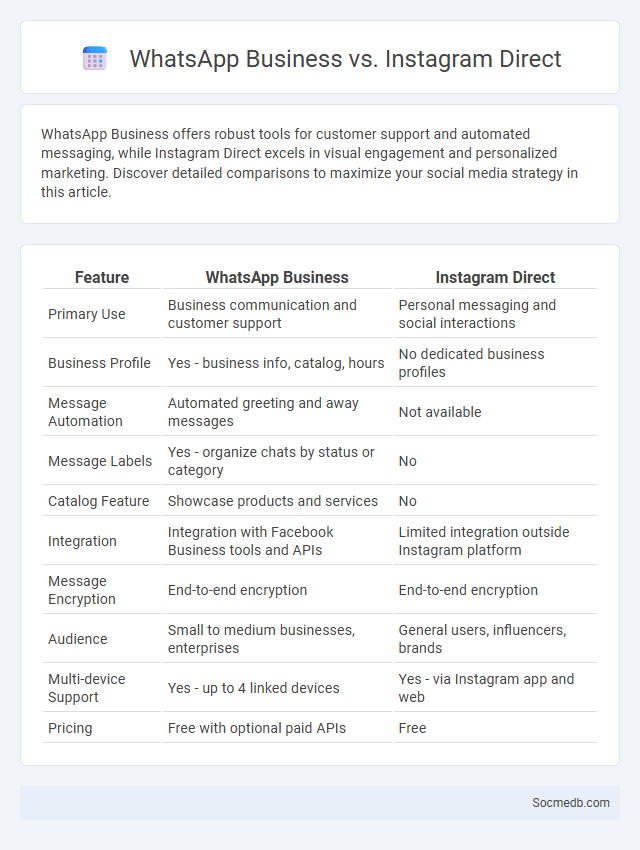
Photo illustration: WhatsApp Business vs Instagram Direct
WhatsApp Business offers robust tools for customer support and automated messaging, while Instagram Direct excels in visual engagement and personalized marketing. Discover detailed comparisons to maximize your social media strategy in this article.
Table of Comparison
| Feature | WhatsApp Business | Instagram Direct |
|---|---|---|
| Primary Use | Business communication and customer support | Personal messaging and social interactions |
| Business Profile | Yes - business info, catalog, hours | No dedicated business profiles |
| Message Automation | Automated greeting and away messages | Not available |
| Message Labels | Yes - organize chats by status or category | No |
| Catalog Feature | Showcase products and services | No |
| Integration | Integration with Facebook Business tools and APIs | Limited integration outside Instagram platform |
| Message Encryption | End-to-end encryption | End-to-end encryption |
| Audience | Small to medium businesses, enterprises | General users, influencers, brands |
| Multi-device Support | Yes - up to 4 linked devices | Yes - via Instagram app and web |
| Pricing | Free with optional paid APIs | Free |
Overview: Comparing WhatsApp Business, Instagram Direct, and Business Accounts
WhatsApp Business, Instagram Direct, and Business Accounts each offer unique features tailored for effective social media marketing and customer engagement. WhatsApp Business provides direct, personalized messaging with automated responses and catalog options for small businesses, while Instagram Direct facilitates interactive visual communication and instant messaging integrated within the Instagram platform. Your choice should align with your business goals: WhatsApp is ideal for one-on-one customer support, Instagram Direct enhances visual storytelling, and Instagram Business Accounts offer robust analytics and advertising tools for broader market reach.
Key Features of WhatsApp Business
WhatsApp Business offers essential features such as automated messages, quick replies, and labels to organize customer interactions efficiently. It supports a business profile where you can showcase your contact details, location, and catalog of products or services. Your ability to communicate directly with customers through secure, encrypted chats helps build trust and streamline support.
Instagram Direct Messaging: Core Capabilities
Instagram Direct Messaging offers seamless real-time communication through text, photos, videos, and voice messages, enhancing user interaction and engagement. It supports group chats, message reactions, and disappearing content, creating dynamic conversational experiences. Advanced features like message requests, link previews, and integration with Instagram Stories boost connectivity and user convenience within the platform.
What is a Business Account? Benefits & Limitations
A business account on social media platforms like Instagram and Facebook provides brands with tools for audience insights, advertising, and enhanced profile customization. Key benefits include access to analytics for follower demographics, direct engagement features like call-to-action buttons, and the ability to run targeted ad campaigns to boost visibility and sales. Limitations involve potential privacy concerns, algorithm restrictions that may reduce organic reach, and the necessity for consistent content management to maintain audience engagement.
User Experience & Interface Differences
Social media platforms vary significantly in user experience (UX) and interface (UI) design, with each tailored to specific user behaviors and content types. Instagram emphasizes a visually-driven, minimalist interface prioritizing images and short videos, enhancing engagement through seamless scrolling and quick interaction. In contrast, Twitter focuses on text-based content with a real-time feed layout, incorporating compact, information-dense cards for concise communication and efficient content consumption.
Messaging Automation and Chatbot Support
Messaging automation and chatbot support enhance social media by providing instant, personalized interactions that improve customer engagement and response times. Businesses leveraging AI-driven chatbots can handle numerous inquiries simultaneously, increasing efficiency while gathering valuable user data for targeted marketing. Integrating these technologies into platforms like Facebook Messenger and WhatsApp boosts scalability, reduces operational costs, and drives higher conversion rates through seamless communication.
Integration with Customer Relationship Management (CRM) Tools
Integrating social media with Customer Relationship Management (CRM) tools enhances Your ability to track customer interactions, analyze engagement patterns, and tailor marketing strategies effectively. This integration allows businesses to centralize customer data, streamline communication, and improve lead generation by combining social media analytics with CRM insights. Leveraging this synergy boosts customer satisfaction, loyalty, and drives data-driven decision-making across multiple platforms.
Marketing and Promotion Opportunities
Social media platforms offer unparalleled marketing and promotion opportunities by enabling targeted advertising based on user demographics, interests, and behaviors. Brands can leverage influencer partnerships and user-generated content to increase engagement and build authentic connections with their audience. Real-time analytics provide valuable insights for optimizing campaigns, maximizing ROI, and enhancing customer reach across channels like Instagram, Facebook, Twitter, and TikTok.
Security, Privacy, and Data Policies
Social media platforms implement advanced encryption and multi-factor authentication to enhance user security and protect against unauthorized access. Comprehensive privacy settings allow users to control data visibility and sharing preferences, complying with regulations like GDPR and CCPA. Transparent data policies detail information collection, storage, and third-party sharing practices, ensuring user trust and legal compliance.
Choosing the Right Platform for Your Business Needs
Selecting the ideal social media platform depends on your target audience, business goals, and content style. Facebook and Instagram offer robust advertising tools ideal for brand awareness and visual storytelling, while LinkedIn excels in B2B networking and professional services. Prioritize platforms where your customers are most active and align features with your marketing strategy to maximize engagement and ROI.
 socmedb.com
socmedb.com